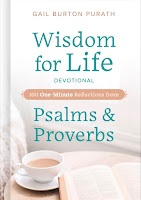Here are five ideas for improving your Bible study time:
1. Do a word study.
Using a concordance, look up a word you want to study. For example, if you wanted to do a word study of "heart," you'd look up every reference in Scripture and write down what each passage reveals about your heart, God's heart, or the hearts of others.
2. Do a topical study.
When we study a particular subject, we want to know all that Scripture teaches. For example, if we want to study prayer, we can use a topical Bible and study all pertinent passages. To see the importance of topical studies, read the one-minute devotion Understanding Prayer in Context.
3. Use the "3x3 method."
Read a passage three times a day for three days to let it sink into your spirit. (3x3 Details)
4. Memorize key passages.
When we memorize Scripture, we "hide" it in our hearts and it comes to mind whenever we need it to guide us, encourage us, and warn us. (6 Ways to Make Scripture Memory Easier)
5. Study with a friend or group.
Group study provides additional insights and accountability. (More about benefits of community)
▻A Bible concordance is an alphabetical list of the English words used in a specific Bible translation. The most famous concordance is Strong's Exhaustive Concordance of the KJV, first published in 1890 but still used today. Created before the time of computers, it took thirty-five years to complete, and it lists the location of every word found in the KJV, including the word "the."
▻A topical Bible lists Bible passages together based on the subject.






Lovely new inspiration, thank you
ReplyDeleteThanks for this advice, I am inspired as well!
ReplyDeletethank you for the information. be blessed
ReplyDeleteLove this simple and sweet!!
ReplyDeleteGreat ideas!
ReplyDeletevery helpful, God bless!
ReplyDeleteI really like my chain reference bible as a help in study. I haven't heard of the 8x8 idea. Will have to try that. Thanks!
ReplyDeleteExcellentExcellent!
ReplyDeleteWhat version of the bible helps you to study the best?
ReplyDeleteHi Lisa,
DeleteI've always liked to compare different translations.
When we studied the various translations in seminary, they taught us that the New American Standard Version offers one of the most accurate translations from the Hebrew and Greek, but it's not always the easiest to understand.
If I'm studying a single verse, I usually look it up on Bible Hub online because it offers about 15 different translations to compare. And if it's more than one verse I usually look it up on Bible Gateway and choose NIV, NLT, ESV, and NASB.
I don't recommend paraphrases for serious study, and I think there are errors in The Message and The Passion Translation (which is actually a paraphrase, not a translation). The Passion Translation is especially troubling as the author believes God gave him additional thoughts not included in the original manuscripts.
If you look on my right sidebar on my blog, you'll see a picture that says, "Are Modern Translations corrupted?" If you click on that, it gives more insights into how the various translations are made.